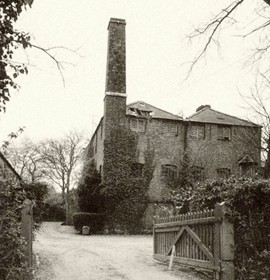|
The
Market
Deeping
distillery
|
 |
There was once a distillery in
Market Deeping, established by local doctors William Holland and William
Page in the early years of the 19th century to produce essential oils from
herbs and other plants for the manufacture of medicines, ointments,
lotions and linaments to treat the variety of ailments and physical
conditions that afflicted Victorian society.
Patent remedies were widely available as a
universal panacea and the reaction of most people when feeling unwell was
to buy a bottle of something which they thought would improve their
condition.
The venture began in a small way with one copper urn out in the open air
and later from a small shed with a thatched roof before a permanent
distillery was built in 1836 and 400 acres of land rented from the church.
The land was soon in useful production for
the cultivation of a variety of herbs such as thyme, caraway, mint,
hemlock and rosemary, belladonna, henbane, clover and poppy while the
fields of lavender when in bloom were reckoned to be particularly
beautiful. Dandelion roots were brought in by villagers for planting
during the winter months and the company even imported liquorice plants to
add to their remedies.
Many men and women worked there and children were employed during the
school holidays to help with the planting and picking of herbs while the
essential oils they produced were sold throughout England and abroad,
winning medals at many international exhibitions in London, Paris and
Berlin, while the quality of the products was endorsed by the leading
apothecaries of the day on account of their excellent quality.
One particular favourite was peppermint water, recommended for colds and
stomach ailments when taken hot, a popular purchase for visiting relatives
who invariably took a bottle with them when they returned home although
samples were also given away free to villagers when supplies became
abundant.
The cultivation of herbs continued as a flourishing industry and even
spawned a similar business in the United States but eventually ceased
production and in 1906 the distillery estate was put up for sale but sold
in lots to various buyers and so the distillery did not survive.
The actual building remained and although there were attempts to preserve
it as being of historic interest, it was finally demolished in 2006 and
the land developed for new housing although the venture is remembered in
various streets which are named after herbs and plants such as Rosemary
Avenue and Clover Road while one has even been called
Still Close.

Go to:
Main Index Villages
Index
|
